- Home
- Susanna Kearsley
Season of Storms Page 2
Season of Storms Read online
Page 2
That said, I didn’t think it wholly accidental that he’d wanted me to meet him here, at St. Paul’s, Covent Garden.
This was the ‘actor’s church,’ a landmark of the theatre district, the names on its marble memorials reading like some sort of heavenly cast list: Sir Michael Redgrave, Dame Edith Evans, Sir Noël Coward . . . all properly humbling to someone like me, who had only just cracked the West End, and that in a role with ten minutes onstage and three lines, barely noticed by anyone. Still, here in St. Paul’s I felt rather more than that, part of a larger community.
Even the building was one of us, having taken its role over from the original church, which fell victim to fire in the reign of Queen Anne. The original had been the creation of architect Inigo Jones, whose love of the Italian Renaissance had inspired him to try to reshape the whole of Covent Garden into one of the grand open squares, or piazzas, he’d so admired in Italy, and this second St. Paul’s, built to copy the first, was ladylike and graceful. With its plain glass Palladian windows, etched here and there with a tracing of gold, its white and gilded ceiling and its candle chandeliers, it looked—as Inigo had intended it to look—like a small bit of Italy transplanted whole to the centre of London.
Rupert, I knew, would have thought of that, too. He’d always been a master at manipulating people’s moods through setting. And although he’d never tell me outright whether I should take the job, I knew which way his mind lay from the fact that he had steered me to this place, where my subconscious would be bathed in thoughts Italian while I contemplated Celia.
‘Celia the First,’ Rupert always called her, as though we had both sprung from the same royal line. In truth I’d come to feel a kind of kinship with her, even though we had no bond of blood. I had so few true relations—just my mother, and an uncle who’d died childless in New Zealand—that adopting Celia the First as an honourary ancestor had given me that sense of continuity that comes from spotting one’s own eyes in ageing photographs of youthful strangers, knowing that they’re family.
She hadn’t actually been buried here, at this church. No one knew for certain where her body lay, or if in fact she were actually dead, though her death was assumed from the fact that the memorial stone I was looking at now had been placed in St. Paul’s by the one man who ought to have known what became of her—the actor, himself now forgotten and buried, for whom she’d allegedly left Galeazzo D’Ascanio. I say ‘allegedly’ because there were some who said that Galeazzo had killed her himself, and that the whole tale of her running away with that young English actor had been a fabrication, and an unconvincing one at that. What actress, after all, would run away the night before her play was set to open?
I, for one, almost preferred the murder angle. I didn’t like to think of Celia the First growing old in obscurity.
I breathed a little sigh that swirled with scents of musty oiled wood and dust upon the marble and, still looking up, said to Rupert, “I can’t believe you kept it a secret, your doing this play. You were hired when? Last autumn? And you didn’t think to tell me?”
“I thought it would make a nice surprise for your birthday.”
Only Rupert would have thought of that. But then, he’d always been able to hold on to information much longer than anyone else I knew. He was patient with a secret.
“Well,” I said, “I take it that you’ve met this chap who’s putting on the play?”
“D’Ascanio’s grandson, yes. He stopped in on his way to New York last October, took me out to lunch.”
“And what’s he like?”
Rupert had always been a good judge of character. As a teenager, I’d made a point of bringing all my boyfriends round to meet him, so that later I could grill him on their weaknesses and strengths. He’d never tell me who to date, of course, but his keen observations had saved me a small lake of tears. I watched him now while he considered my question. “Rather quiet,” he said at last, “and not overly social. A bit bloody-minded. But then he’d have to be, wouldn’t he, to do what he’s trying to do. It’s not only the theatre he’s restoring, it’s the house as well. He’s giving the whole estate over to the Forlani Trust to manage, so I’m told, and they’ll be helping with the cost of restoration, but even so it must be costing him a fortune. The house, he said, was closed up in his father’s day, and no one’s lived there since.”
An image flashed across my mind of cobwebbed corridors and shadowed rooms devoured by dust—a Gothic setting worthy of the poet who had written plays with names like A Love Decayed and City of the Damned.
I’d seen both plays performed, but I had never seen the one that Galeazzo’s grandson hoped to stage, Il Prezzo. No one had. Il Prezzo—The Price—had been written as a gift of love for Celia the First. After fifteen years of silence, during which he’d only written a few forgettable verses, Galeazzo had on some sudden inspiration inked his pen again and in one fevered month of creation had produced, in English yet, the play that every critic called his best. That same inspiration had moved him to construct a theatre on the grounds of his estate where he could mount his own production of the play, and where his beloved Celia could once again weave her spell over an audience.
It would have been a triumph, if she hadn’t up and vanished on the night of final dress rehearsal, never to be seen again.
Since then, the play had gathered something of a reputation. Several companies had tried to put it on, but each had faced its own disaster, from an actress falling through the stage trapdoor and breaking both her ankles, to a roof collapsing under a torrential rain that flooded out the set. If Shakespeare’s Macbeth was considered ‘the unlucky play’ among actors, Galeazzo’s Il Prezzo was the proverbial black cat passing under a ladder—the ‘unstageable play.’
Which was probably, I thought, why the project so appealed to Rupert. He had always liked a challenge.
Mind you, if anyone could put the damned play on, it would be Rupert. He was a bit bloody-minded himself, and one of the best directors in the business. Galeazzo D’Ascanio’s grandson had done well to snag him—Rupert’s name alone assured a play success.
And I was tempted.
“I don’t know, Roo.” I exhaled a breath that fell short of a sigh and looked down again, turning away from the memorial stone. “I don’t know that I’d feel quite comfortable taking a role like this.”
“Why not?” His question made no judgement.
“Well, for one thing, I haven’t auditioned. He’s never even seen me act. He’d never have known I existed if you hadn’t told him.” There was an accusation in my tone, and he responded with a calm defense.
“You only came up in conversation because—”
“Because of my name. I know.”
Silence for a minute, as both of us looked up again at the marble memorial stone. Rupert coughed. “He does have my word for your abilities.”
“Yes, well.” I glanced back, slanting him a smile. “You are a little biased, don’t you think? And anyhow, that’s just what I’ve been saying—I don’t want to get a part because of who I know, or whose daughter I am, or whose name I happen to have. Besides,” I said, “I’m building a career as Celia Sullivan, I can’t just throw that all away, not now. And if I do this play as Celia Sands, I might as well forget about my stage name, because everyone else will—it’s going to get attention, this play, because of what it is, and where it’s being done. If I do it, I’ll be Celia Sands for the rest of my life.”
“You have to do what you think best, of course.” Glancing down at his watch, he said, “Come on, time we were going. I told Bryan we’d meet him at the club at seven sharp, and it doesn’t do to leave him sitting too long in the bar.”
“You think I should take the part.”
“I haven’t said anything.”
“But you think I should take it.”
He smiled, not replying; turned and, hands in pockets, led me back along the peaceful dimness of the aisle towards the door, while from the shadows in the corners
all the actors who still haunted St. Paul’s Church appeared to watch and wait, as I did, for his answer.
ii
I’D always loved Rupert’s club—one of those secretive places tucked well out of sight down a tight cobbled alley. After all these years I still wasn’t sure just which turning to take, and had to trust to Rupert’s memory. He found it unerringly, leading me down through the crowded brick buildings and dark unmarked doorways that looked as though they hadn’t changed since the days of Dickens, as though they remembered the gaslight and coal dust and hansom cabs clopping unseen through the neighbouring streets.
At a nondescript green door he stopped, and rang the bell.
I heard the sound of footsteps coming down the stairs inside, and then a small square panel high up on the door swung halfway open on its hinges—my favourite part of the ritual. The porter’s eyes held faint suspicion till they saw the man beside me.
“Evening, Mr. Neville, sir.” The bolt slid back, and we were ushered in. “You’re expected upstairs.”
The staircase was my second-favourite feature of the club—it looked so deliciously ancient and rickety, rising a full storey up at an angle that only the fittest of members could manage unaided.
I had no idea how the porter did it, puffing up and down all afternoon and evening. He had to be, by my reckoning, rising seventy at least—he’d been porter here long before Rupert had become a member, and one had the impression that he’d been here as long as the building had, eternally condemned like poor old Sisyphus to climb and descend for eternity.
It was a killer of a staircase. Even I, at twenty-two and with aerobics classes twice a week, felt slightly winded at the top. There, in the narrow panelled room that served as entry hall and cloakroom, the porter took my coat in silence—to conserve his own breath, I suspected—and, turning, led us down along the corridor, with glimpses here and there through open doors of quiet drawing rooms and lounges lit with warmth. This had been a private house, once, though I couldn’t really picture it as anybody’s home, this rabbit’s warren of tiny rooms with creaking floors and twelve-foot ceilings. Still, it was a matter of record that up to the 1750s a doctor had lived here, whose love of the theatre had led him to leave his entire estate to be used as a club for directors and actors and others who worked with the stage.
Rather a progressive establishment, for its time, it had allowed women as guests since before the first war, and as members since the early 1970s, and though children were not technically permitted Bryan and Rupert had brought me here for birthday lunches every year since I’d turned six. “And why not?” Bryan had once asked my mother. “She’s much better behaved than most actresses one sees at dinner these days.” Which was a straight shot at my mother, I think—though she probably wouldn’t have noticed.
Bryan was waiting for us now beside the bar, with his back to the elegant windows whose curtains had not yet been drawn against the waning evening light. From the level of Scotch in his glass I could tell that he’d been here awhile, which meant that we were late, since Bryan was always dead on time.
The Scotch had strengthened his Aussie drawl. “We did say seven,” he reminded Rupert, leaning round to kiss my cheek. “Happy birthday, Angel.”
“Thanks.” I kissed him back. “It’s my fault, really—”
“We were over to St. Paul’s Church,” said Rupert. Greeting the barman, he ordered a Scotch for himself. “And what will you have, Celia? Sherry? Right. And a glass of the Amontillado, please.”
“And what were you doing,” asked Bryan, “at St. Paul’s?” But he knew. I could tell from the smile at the edge of his eyes. Bryan had marvellous eyes—they could speak in a silence.
He was older than Rupert by several years, but seemed younger for some reason, maybe because he was more energetic, less languid, more given to moods. His face, too, was sharper in outline, expressive, with that prominent jaw and cleft chin that seemed somehow reserved for Australians. His skin, after twenty-odd years in our pallid weather, still bore the marks of a youth spent in subequatorial sunshine, creased deeply round his eyes and mouth to reveal the way he smiled. He’d looked the same for as long as I could remember—restless activity kept him from ageing. His golden hair had only just started to show at the temples the grey that had long ago sneaked into Rupert’s.
Since childhood I had played a secret game of giving roles from Shakespeare’s plays to the people around me. Bryan I had cast as Romeo and Juliet’s Mercutio, witty and clever and swaggering round with a sword in his hand, whereas Rupert was more of a Brutus from Julius Caesar, reflective and careful. They balanced each other, like all well-matched couples.
They’d met quite by chance in the year of my birth, on a lazy hot Sunday in St. James’s Park. Bryan had still had his dog then—a lurcher named Oscar—who’d taken a liking to Rupert in passing and bounced him clean over. “And that,” Bryan told me, “was that.”
In the theatrical world, where people changed partners the way they changed socks, Bryan and Roo were a rarity. Bryan and Roo—I always thought of them like that, like bookends, each one incomplete without the other. Theirs was the only truly stable relationship I’d ever observed. It helped, I think, that Bryan was not theatrical. He worked in R and D for a pharmaceuticals firm, probably the furthest thing from Rupert’s world and mine one could imagine. Having lived for years at a microscopic level, he saw things with precision.
“You’ve had your letter, then,” he said, “from Italy.”
“How did you know about that?”
He shrugged. “Roo told me it was coming. And you have that look you get when you’re trying to make up your mind about something. You haven’t decided?”
“Not yet, no.”
Picking up his glass again he nodded understanding. “It’ll be the name thing. If you want my opinion—”
Rupert interrupted. “We’ll just let her make her own decision, shall we?” Passing me my sherry, he said, “Now then, do you want your presents now, or after dinner?”
“Now, please.”
“Oh, big surprise,” said Bryan, drily. But he was as much of a child as I was, and from the way he bent to fetch my birthday presents from his briefcase I could tell he hadn’t wanted to wait, either. There were two gifts, one small and square like a jewellery box and one flat like a book. “The book’s from Roo. Mine isn’t as well-wrapped as his, and it’s Christmas paper, all I could find in the house, but I reckoned you wouldn’t mind.”
I didn’t. I opened his first, and stared at the blue box. “From Tiffany’s?”
“Yeah, well, I took a walk down Bond Street last week, and—”
“Oh, Bryan.” I drew out the delicate pendant and chain, let it trickle across my splayed fingers. “It’s beautiful.” A tiny golden angel with a diamond for her head, its facets trapping every colour of the rainbow in the soft light of the bar. It was Bryan’s pet name for me, ‘Angel’—he had called me that forever.
“It just looked like you,” was his excuse for spending so much money, when I thanked him with a moist-eyed hug and kiss. “A little guardian angel to keep you safe; we could all use one of those.”
He stepped in behind me to fasten it on while I picked up my second gift. Rupert sent me a dry look. “I can’t top Tiffany’s, I’m afraid.”
He was no slouch when it came to gift-giving either, though. Rupert nearly always gave books, but they weren’t just any books—he had a penchant for rare volumes, little treasures he’d mined from the shelves of some tucked-away secondhand bookshop. This year’s gift was no exception.
The book itself was small and slim and physically lovely in the way that well-made books are, with a tooled red leather binding and pages whose edges gleamed gold. The Season of Storms, read the cover, in fanciful gilt lettering, and under that, The Celia Poems. I looked at Rupert, disbelieving. “Where did you find this?”
My reaction had pleased him. “Little shop near the British Museum.”
“I’ve been
looking for ages . . .”
“I know.”
Bryan, still fiddling with the clasp of the angel pendant, leaned in and had a look over my shoulder. “What is it?”
I held the book higher to show him. “The poems that Galeazzo D’Ascanio wrote for Celia Sands, or at least the ones he dedicated to her. Some of them he wrote afterwards.”
“Afterwards?”
“After she went to . . . wherever she went to.”
“Ah. I hope they’ve been translated.”
“No need,” I said. “They’re in English, he wrote them in English.” The frontispiece was a hand-coloured photograph of Celia the First posed like a classical statue against a stone parapet, presumably on the terrace of Il Piacere itself, with a tableau of mountains and blue lake behind her. I touched the picture gently, as though seeking a connection.
Bryan turned to Rupert with a grin and threw his own words back at him. “ ‘We’ll just let her make her own decision, shall we?’ You old fake. You’re trying to nobble the girl.”
“I’m doing nothing of the kind. I saw the book and remembered she’d been wanting it, so I bought it, that’s all.”
But I had to admit he’d timed the gift conveniently, just like our meeting tonight at St. Paul’s, and I couldn’t help but wonder why Rupert, who usually took such pains not to influence me one way or another, was coming so perilously close to offering an opinion.
Bryan by contrast had never been reluctant to tell me what he thought I ought to do. Picking up his drink again, he settled back to take stock of my problem. “I am right, though, aren’t I, Angel? It’s the name thing that’s stopping you?”

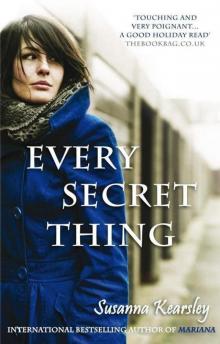 Every Secret Thing
Every Secret Thing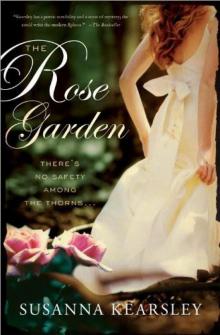 The Rose Garden
The Rose Garden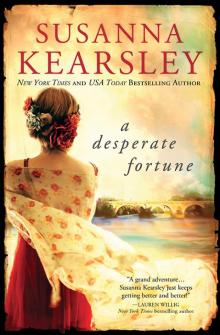 A Desperate Fortune
A Desperate Fortune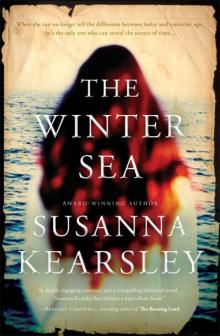 The Winter Sea
The Winter Sea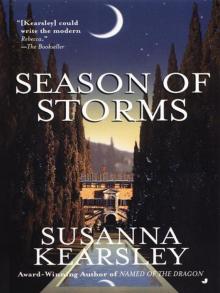 Season of Storms
Season of Storms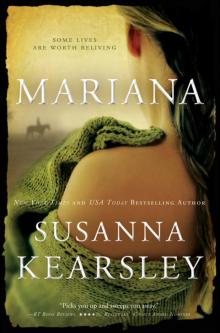 Mariana
Mariana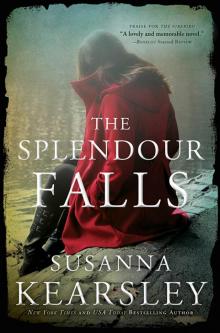 The Splendour Falls
The Splendour Falls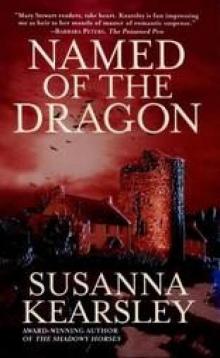 Named of the Dragon
Named of the Dragon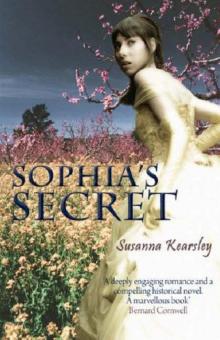 Sophia's Secret
Sophia's Secret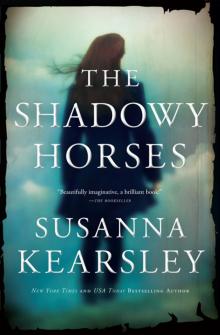 The Shadowy Horses
The Shadowy Horses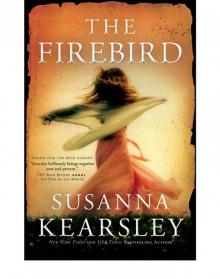 The Firebird
The Firebird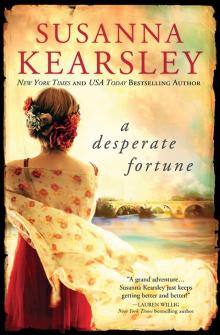 Desperate Fortune
Desperate Fortune